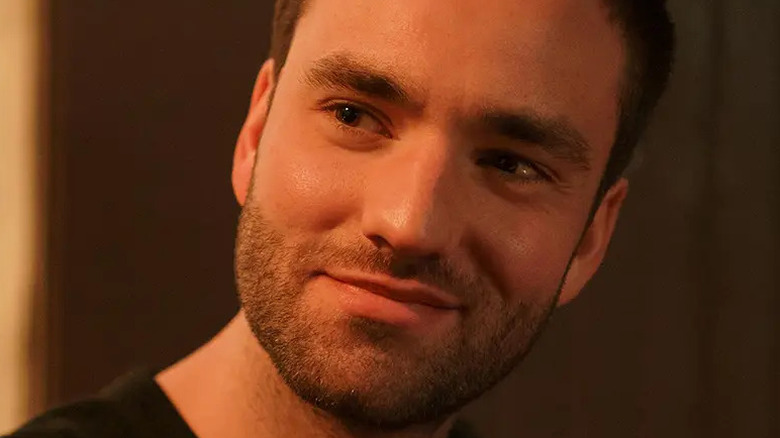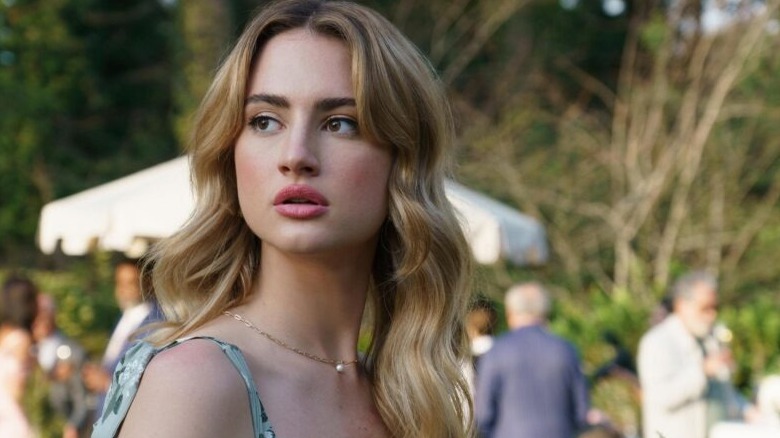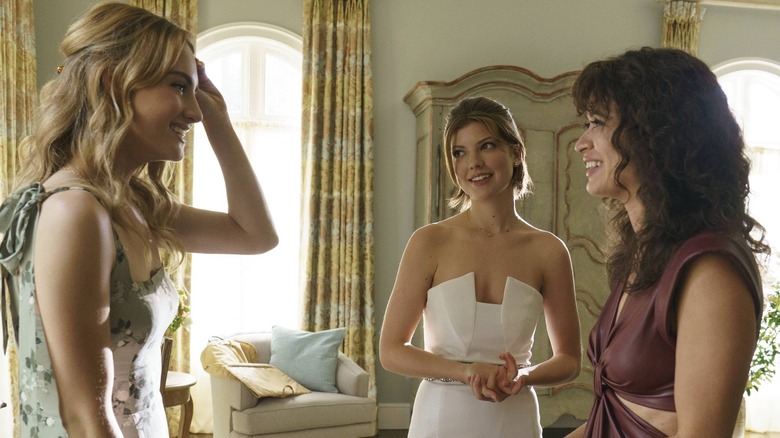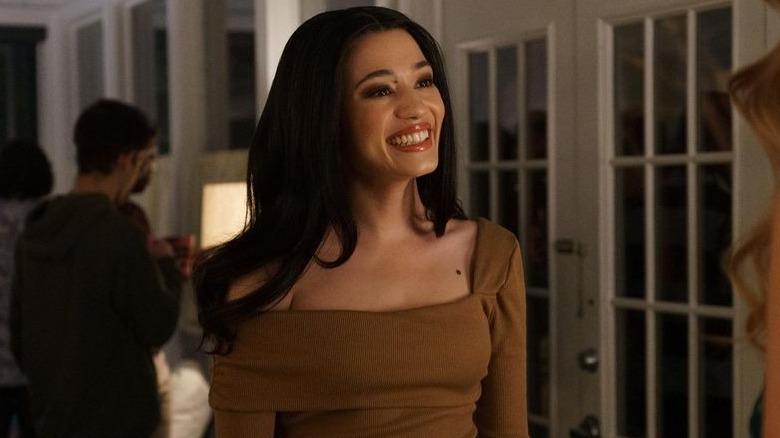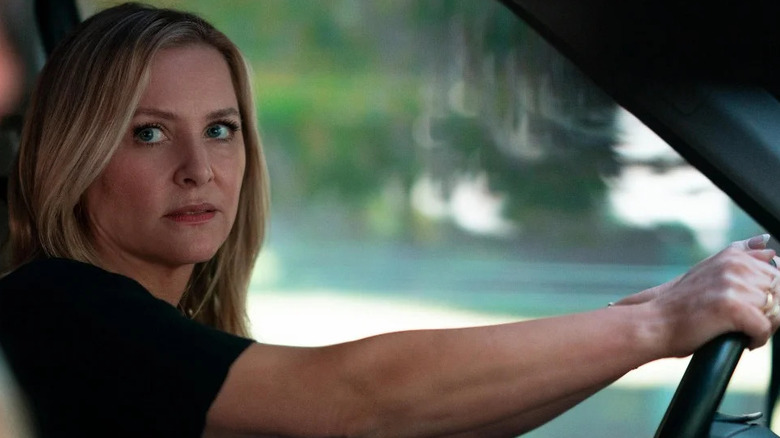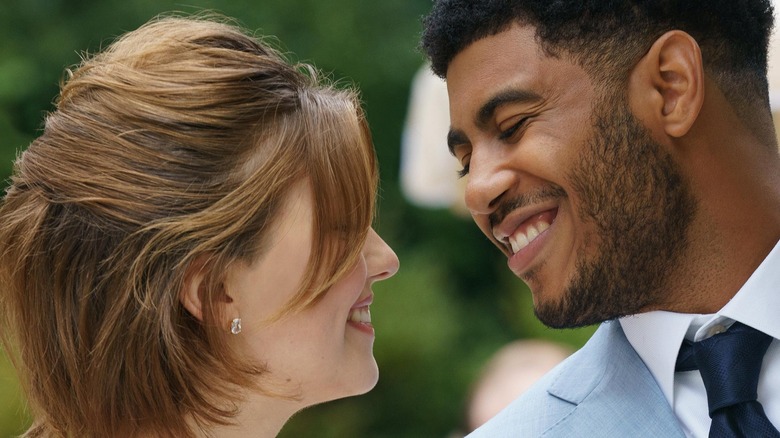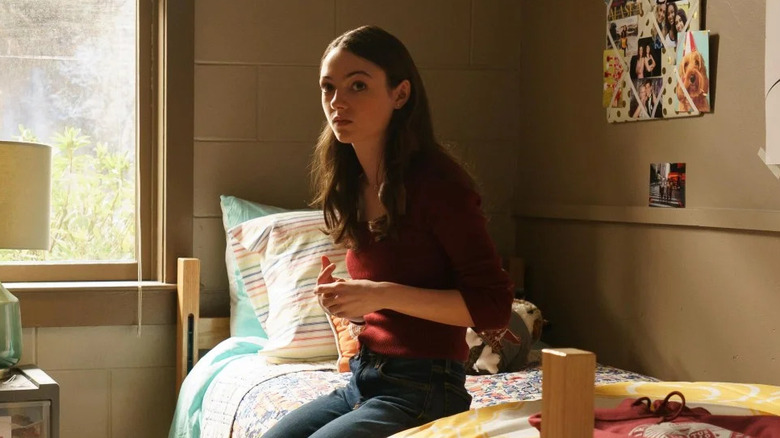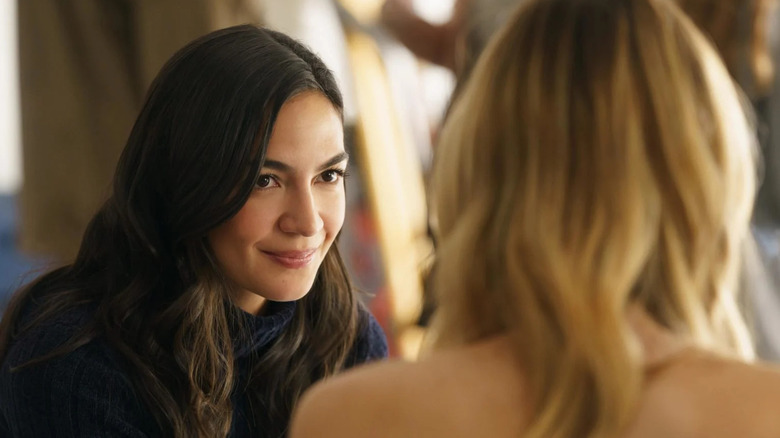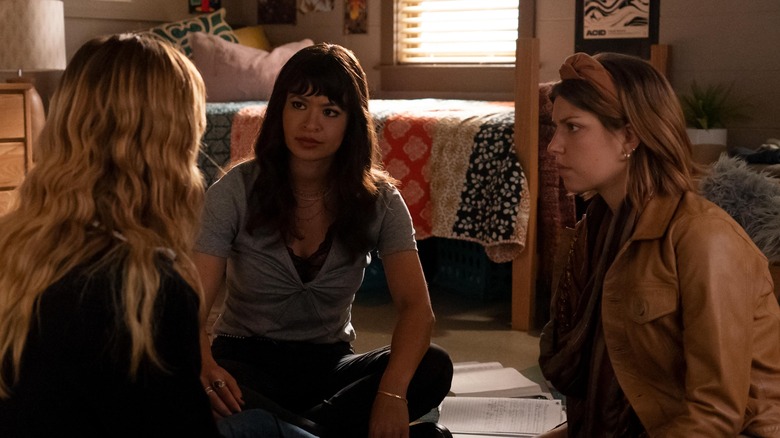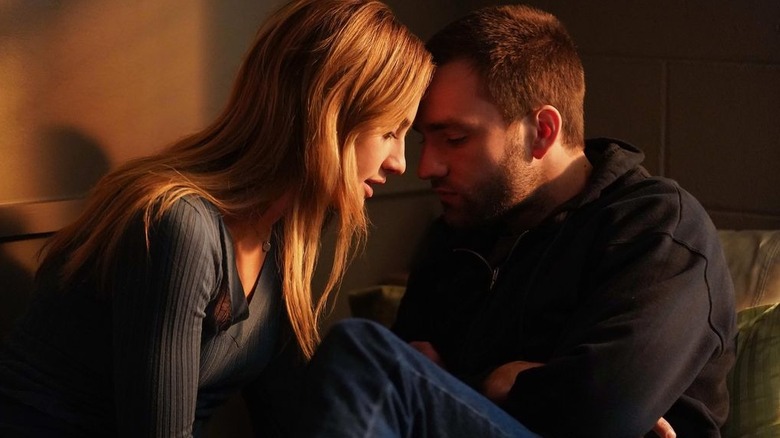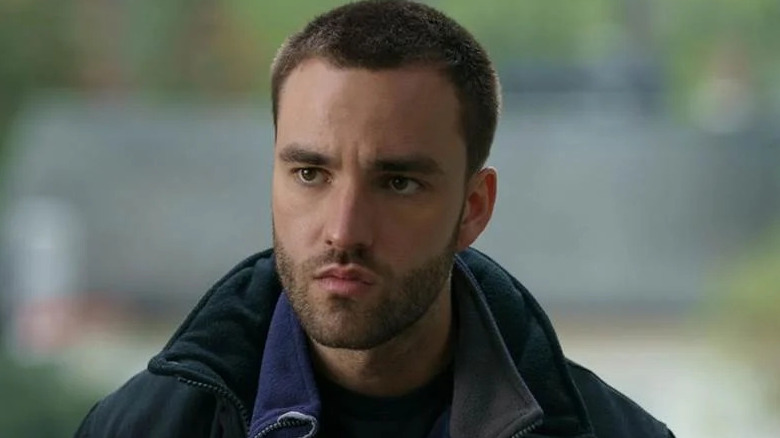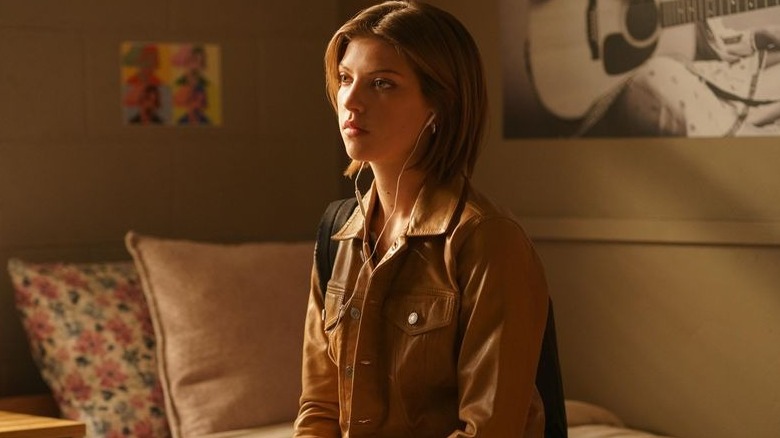The Major Differences Between Hulu's Tell Me Lies And The Book
For some viewers, one of the greatest deterrents to watching a show about high school students is that the turmoil the characters engage in often appears improbable for someone their age. Even ratings titans such as "Euphoria" are guilty of this now and again. However, Hulu's drama "Tell Me Lies" avoids this drawback to some degree by taking place on a college campus.
"Tell Me Lies" follows Stephen and Lucy as they navigate one of the worst relationships in recent TV history and how it impacts everyone around them. The plot of the first season begins in 2007 and spans eight years. Thus, the series smartly chooses era-appropriate rock songs for the soundtrack and nearly every character sports a blackberry. All of this adds to the show's immersive quality.
The show is impressive, and it's not just because it's created by "Fear the Walking Dead" alum Meaghan Oppenheimer. The drama is based on Carola Lovering's book of the same name. As expected, the show takes creative license with the novel and alters some events. Screen adaptations change events from the source material for a variety of reasons. Sometimes the cause is as simple as making the show's filming more convenient, and other times the screen adaptation simply has different goals. Let's look at all that and more as we explore the major differences between Hulu's "Tell Me Lies" and the novel.
Lucy's eating disorder was eliminated from the show
The novel wants the reader to know immediately that Lucy (Grace Van Patten) has an eating disorder. Lovering's prose goes into great detail from the opening page, outlining — with an appropriate amount of earnestness – how Lucy's eating habits impact her daily life.
The show, however, does not mention Lucy's eating disorder. Instead, the show concentrates solely on situations that could conceivably influence Lucy's co-dependent relationship with Stephen. As a result, the show's initial introduction to Lucy centers on the fact that she has never had a passionate relationship. For example, Lucy breaks up with her high school boyfriend in the first scene because she is not interested in having a long-distance relationship when she moves to college. However, she is quite cold about the breakup, prompting the ex-boyfriend to accuse her of being broken inside.
As a result, viewers of the show can more readily empathize with Lucy's fear of parting with Stephen because she believes she may never feel the same way again. It also aids the show in avoiding the pitfalls of casually bringing up a serious topic that affects many people in the real world. The streamlined version of Lucy works better for the show's objective of exploring a toxic relationship, but that said, Lucy's eating disorder might still be portrayed in a potential future season.
Lucy's family has a different past
Lucy's hometown of Cold Harbor, Long Island, doesn't get any attention in the series. The viewers are only told that Lucy's father was in the army and her mother is a working mother. As a result, the show implies that Lucy is upper-middle class. This softens the contrast between her upbringing and Stephen's background. In fact, with the exception of Evan, no one in their friend group appears to be particularly wealthy.
The book, on the other hand, dives deeper into Lucy's past. The book's version of her father works in finance and never serves in the military. The book also strongly emphasizes their family's lifestyle. Everyone who grew up with Lucy has lofty goals of attending an Ivy League school, and while tennis is only mentioned briefly on the show, it's all the rage among Lucy's childhood friends in the novel. Furthermore, Lucy's mother's portrayal in the book is profoundly entrenched in her position as a new member of the upper-class, having not come from such a family herself.
While the book provides a more in-depth understanding of these characters, the show's writers clearly focus less on Lucy's background, which helps the show avoid distractions that would not have made a meaningful contribution to the story's focus. Lucy's journey on the show has nothing to do with her wealthy upbringing, and it was ultimately prudent to only briefly mention it.
Bree's engagement party
The first episode begins at Bree and Evan's engagement party, eight years after the show's college-era events. While Bree (Catherine Missal) is getting ready with her best friends Lucy and Pippa (Sonia Mena), the two begin making fun of Lucy and tease her about her capacity to keep her cool in the presence of Stephen, who is also attending the party.
All of this plays out differently in the book. First and foremost, it is not an engagement party — it's a wedding. While Lucy does not bring her boyfriend to the occasion in the novel or the show, the reason is not the same. In the book, Bree does not accept plus-ones unless they are married or engaged; in the show, Lucy chooses not to bring her boyfriend and lies to her friends by telling them he is stuck at work.
The real cause for this lie could be explored in a possible second season. It's possible that Lucy isn't quite over Stephen and doesn't want him to see her with someone else. It's also possible that Lucy has other motives entirely. Hopefully, everything will be revealed soon.
Diana and Lucy's interactions
Diana (Alicia Crowder) is Stephen's on-again, off-again girlfriend. And as is the case for all of Stephen's relationships, he harbors resentment toward her. He clearly cares about her, but in a complex and possessive way. Stephen is also envious of Diana — it's almost as if she won the lottery when she was born. Diana is both gorgeous and intelligent, and she hails from a wealthy family.
While Diana's portrayal in the show is somewhat one-dimensional, it is still more than she gets the novel. Readers only learn about Diana through Stephen's harsh point of view in the book, and she never interacts with Lucy. So it comes as quite a surprise when the show chose to show Diana and Lucy chatting early on at Diana's fundraiser. During the brief talk, Lucy realizes that Diana is actually a decent person.
The show's insistence on fully realizing all of the characters involved in Stephen and Lucy's relationship only helps to demonstrate how even one dysfunctional relationship can bring out the worst in everyone it impacts. Ultimately, despite her dignity, Diana recognizes that playing dirty is the quickest way to get what she wants.
CJ's affair
Lucy's friends notice that she saved her mom's number as "CJ" fairly early in the series. When they ask why, Lucy just answers that her mom lost the right to be saved as "mom." This is only properly addressed once Lucy confides in Max about her mother's affair in the Christmas episode.
The affair plays out differently in the show and the book. In the novel, Lucy witnesses her mother's affair with her tennis coach, who happens to be Macy's elder brother. However, the encounter is significantly more personal in the show. Lucy informs Max in the Christmas episode that the day her father died, CJ was in the city with her father's best friend, Jake. And when Lucy's father's health began to deteriorate to the point of no return, Lucy was left to deal with the situation on her own because her mother wasn't returning her phone calls. To make matters worse, it appears that CJ is now publicly dating Jake.
This trauma exacerbates Lucy's alienation from her family and explains why she is less likely to forgive Drew after learning what he did the night Macy died. As a result of what she went through, Lucy has a reduced capacity for forgiveness, which is entirely understandable.
Bree and Evan's relationship
In the episode "Castle on a Cloud," Evan (Branden Cook) invites the entire crew to his family's lake house for his birthday weekend. And the episode focuses on the fractured nature of their friend group and how, despite being the good guy in the group, Evan has his limits. Bree and Evan bond over their shared suspicion that all of their friends are selfish — Evan didn't even trust any of them to get him a cake for his birthday.
Although the series devotes an entire episode to showing Bree and Evan's shared values and the foundation of their relationship, this is not based on the source material. Their romance is understated throughout the book, and their wedding is predicated on the fortuity of their attending the same college. However, the creators of the series also examine the minor aspects of their relationship, such as the two confiding in each other intimate secrets about their childhood that are unknown to everyone else.
The show compensates for the lack of focus on Lucy's youth by fully developing every supporting character. This enhances the story world and raises the stakes when Stephen and Lucy meddle in their lives to save their doomed romance.
Lucy doesn't date anyone else in the book
Lucy has a charming meet-cute with Max in the local pub about halfway through the show. When Bree and Lucy go for a drink, cops do a random check to determine who is drinking without an ID, and the two pals manage to leave the pub through the back door. But just as they are about move forward with the rest of their evening, Bree excuses herself to pee. That's when Max uses the same door for a smoke break and runs into Lucy standing alone in the dark, and they laugh a little. Their connection grows from there.
However, Max is entirely absent from the book. In the novel, Lucy is victimized by Stephen's antics, and her gradual decline into complicity in all the horrible things they do to each other is fairly subtle. Instead, the show's creators choose to be more direct and show Lucy replicating Stephen's worst traits in her treatment of Max. Lucy handles Max like he's her backup plan; she only looks for him when she can't reach Stephen. Similarly, Stephen sees Lucy as a placeholder for when Diana irritates him for any reason.
After Max runs into Lucy and Stephen while walking across town later in the program, Lucy brags to Stephen about how terribly she treated Max. Stephen and Lucy bond over her toxicity ... until Stephen finds out she used to cuddle with Max, which he finds disturbing.
Macy's death
The mystery surrounding Macy's death serves as the show's engine. The night of Macy's death appears to be an unfortunate accident for which no one is directly responsible. However, as the show progresses, it becomes clear that this is not the case. Initially, viewers learn that Drew was present on the night of the accident. Then finally, during the finale (directed by Robin Wright), viewers learn that Stephen —rather than Macy — was drunk driving the car. After the crash, he moved Macy to the driver's seat and ran away.
Lucy only ever knows Macy as a new roommate and doesn't actively look into the circumstances surrounding her passing. Lucy only begins to really consider it after Stephen admits to her that he was present on the night of Macy's death. However, Stephen retells the tale with half-truths, claiming that he was not the one driving and blaming Drew entirely. He explained to Lucy that he fled the scene because he was afraid people would falsely blame him due to his working-class upbringing.
This is handled differently in the book in several respects. For starters, Macy is Lucy's high school friend, and Lucy enters college still plagued by her death. Furthermore, the crash is caused by an argument between Macy and Stephen in the show. In the book, it's caused by Macy performing oral sex on Stephen while he's driving drunk.
Stephen's fiancée
In the show, Lucy's high school friend is Lydia (Natalee Linez). When Lucy breaks up with her high school lover in a very detached manner, Lydia is the first to reassure her that she is not actually frigid but simply expressing herself differently. When Lucy goes to college, the show puts their friendship on hold, focusing instead on her relationship with Stephen and her other college friends. So it comes as a surprise when, at the end of the season, during Bree's engagement party, Lucy and Stephen hold a brief conversation before being joined by Stephen's fiancée, Lydia.
In the novel, Lucy and Stephen reunite at Bree's wedding, and Stephen is engaged, but not to Lydia. Both in the book and the series, the two eventually split up after Stephen realizes he can't use Lucy to further his social-climbing ambitions. They never truly connect for the four years following their college years. So, by the time they finally reunite at Bree's wedding, Stephen has a new fiancée, Jillian, whom he meets after college.
It appears the show's goal is to make everything more personal, and they accomplished this once more by involving yet another person in Lucy and Stephen's drama. However, the show leaves the new development open-ended, with the intention of exploring it further next season.
Their college is in a different location in the book
Budgetary concerns can create key contrasts between books and their on-screen adaptations. In novels, a tale is limited solely by the writer's imagination. Meanwhile, producers must always consider the budget of whatever they're filming. Producers must constantly work out how to portray the story's spirit in the most cost-effective way possible.
As a result, compromises are occasionally required to make a page-to-screen transfer function. In the case of Hulu's "Tell Me Lies," one such concession is the relocation of the show's fictional Baird College from California to New York. While the actual production took place in Georgia, the change isn't totally arbitrary. It makes Lucy's breakup with her high school boyfriend appear more frivolous, and makes Lucy and Stephen more involved in one another's lives. It's almost as though they can't get away from each other, whether they like it or not. They all live close to each other, so it makes sense that despite everything, they'd find a way back to each other.
The show investigates how Stephen and Lucy's relationship affects others
Lucy and Stephen's relationship is a whirlwind. The two bring out the worst in each other and bond over the shared trauma they put each other through. Their relationship is based on power dynamics. They don't confide in each other per se, but instead share information depending on how the revelation might help their standing within the relationship. Seemingly, everyone can see this dynamic is untenable except Lucy and Stephen.
Granted, Stephen is responsible for most of the negative aspects of their relationship, which is the book's focus. However, the show focuses on how their relationship affects everyone else. From minor incidents such as Stephen tossing the camera Bree took from school for Evan's birthday in a pool to keep his relationship with Lucy hidden, to more significant incidents such as Lucy tormenting Drew with a letter regarding Macy's death. The two make life miserable for everyone around them.
The show's consideration of this often-overlooked aspect of toxic relationships is quite subversive. Unfortunately, these relationships exist in the outside world as well, and the collateral damage sometimes affects the people who have nothing to do with the relationship. The show does an excellent job of emphasizing this.
Stephen's class anxiety is more pronounced on the show
Much of the show follows Stephen (Jackson White) as he schemes and plots his way through everyday problems. His behavior can be partially attributed to his uneasiness about coming from a lower-income family than the bulk of his friends. In the show, his father abandons his mother, and they must find a way to make ends meet. And his mother (played by living television institution Katey Sagal) is just as cunning as Stephen when it comes to luring others into her pursuit of what she wants. So even though Stephen isn't very fond of his mother, both factors contribute to the type of man he is.
In a pivotal episode when Diana helps Stephen get a job interview at a prominent law firm, he pretends to be from a more affluent background than he really is. His lies backfire in his face, causing him to lose his opportunity. In the book, his family's financial woes are less pronounced, and his mother is the one who abandons their father, so Stephen is less concerned about money than in the show. But that doesn't mean the show blames his behavior on his upbringing. In contrast, the show also portrays Bree as someone who does not come from a privileged background and has a less-than-ideal family life, but she is always pleasant to all her friends.
The show explores Pippa's sexuality
In contrast to the book, Pippa is one of the most developed characters in the show. The TV version of Pippa confronts Stephen openly about all of his transgressions, and at one point, they even engage in a heated argument about Stephen lying to Lucy about Diana. Beyond her concern for her friend's well-being, she begins a charming fling with Lucy's new roommate Charlie and confides in her that she wasn't popular in high school and, as a result, became a people pleaser in college. Naturally, this ends up in them getting intimate with each other.
The novel does not spend this much time on Pippa. Although she dislikes Stephen, she never confronts him directly. And because Charlie is absent from the novel, none of the interactions between her and Pippa ever take place. In fact, nothing in the book suggests that Pippa ever questions her sexuality.
Instead of focusing just on the main characters, the show offers viewers a chance to follow others on their journeys, developing the show from its source material into a true ensemble piece.
Bree's background
As part of the show's development of every supporting character, Bree gets a more complicated past than we see in the novel. When she meets Evan, it's during an awkward side gig as a nude model in an art class so she can make some money to help with her college life. Later, Evan and Bree meet in the mailroom where Bree is laughing at a postcard. Evan inquires what she is laughing at, and the conversation leads to her telling him that she was a foster child who moved to three different homes throughout her childhood.
On the other hand, the novel spends little time developing her character beyond being Lucy's friend. Her background is never mentioned. And the circumstances under which she meets Evan are different. When everyone else has gone home from school, the two are introduced by Stephen.
The show's concentration on not blending the supporting characters into the background suits its purpose, but it does not necessarily make it better than the source material. The book focuses more on Lucy and Stephen's subjective points of view, and it makes sense why they aren't be too concerned about the details of their friends' lives. On the other hand, the show gives viewers a bird's-eye view of Lucy and Stephen's friends' lives, and both approaches seem to work.
